Note: This book review contains spoilers!
Charlotte McConaghy’s Wild Dark Shore explores the porousness between life and death, and the wearying responsibility of stewarding the living through the buffeting dangers of the world while they are here. McConaghy makes the point that we are capable — perhaps hardwired — to perform extreme acts of self-sacrifice to ensure the survival of our loved ones, but also asks haunting questions about what it means to be sending our children into an uncertain world, imperiled as it is by climate calamities and other lurking evils. The book asks: “What future is worth surviving for?” This motif is carried out at its most literal in the Salt family’s mission to preserve seeds in the event of global destruction. The Salts huddle around the responsibility of safeguarding them, and when they discover that not all seeds can be saved, they must decide which to protect, and which to let go. The rubric for this decision-making is unclear: Do we save the ones most likely to thrive and nourish? Do we protect the rarest of the lot, the ones most likely never to come back? Or do we permit our own imperfect hearts to make the call, favoring those whose features move us? This is, of course, incalculable math, and McConaghy looks roughly and then gently at all parts of the equation.
On Shearwater Island, the dead and the living co-mingle uncomfortably, haunting and reassuring one another in interesting ways. Dom speaks to his dead wife; Rowan is haunted by memories of her brother, River; and Orly communes with the dead creatures on the island. It becomes clear that we can hold onto the people we love even after they are gone — we can carry them with us, speak to them — a truth both comforting and challenging. On the island, we have recently-buried bodies, the voices of the dead, the dark image of happily-living seals and penguins wandering around enormous tubs once used to hold penguins and seals when traders plundered the island. We also have the voices of two deceased characters (Alex and Dom’s wife) occasionally present themselves in the prose, as speakers in different chapters: in these cases, the dead are quite literally speaking among the living. And, in the end, we learn that Rowan’s narrations have always been posthumous, as she dies protecting her “adoptive” son in a final climactic moment. The narrative seems to transcend itself here, performing its own function as a way of uniting people around loss. The text, McConaghy suggests, can hold the entire spectrum of the living and the dead together. In this way, it performs a powerful social function.
I was astounded by McConaghy’s agile toggling between metaphor and plot. You can absolutely read the book as a pulsing thriller, with fabulous cliff-hangers and danger lurking at every turn, but you can also read much of the novel as allegory: what do we do at the end of the world? Her word choice in every line is careful and poetic. I love especially the word “shore” — the liminal, evolving space between land and water. It shrinks in tide; it is continuously falling into the water body adjacent. But it can also be a reprieve, firm ground. This is as perfect an avatar for the feeling of this novel as you can imagine: are we on terra firma, or is the sand disappearing beneath us grain by grain?
There were many vignettes in this novel that lingered, resonant with meaning, for me. I was particularly moved by the description of the whale who lost her baby, and the way that other whales swam to her, retrieved the carcass, and surrounded her in her grief. This happens in our species as well, of course: we huddle around the grieving even when we can do nothing to bring the lost back. This, too, McConaghy points out, is a way of surviving: leaning into the warmth and empathy of others. The other scene that continues to return to my mind’s eye each time I think of the novel: the moment when Dom, his children, and Row have just enjoyed an elaborate and rare feast, and are dancing on the shore. Disaster looms imminent, but they make of their bodies “a language of joy.” This felt like an important cipher for the book: even while standing at the edge of the world, facing unknown peril and likely ending, we can rejoice by forming impermanent connections with one another. We can move together. I saw this motif also in the improvisational poetry of Row joining Dom’s family for a portion of the novel, stepping in as a mother figure. Mitosis, fusion: temporary shapes cluster around one another, then split off.
The book echoes elsewhere in many ways. On a narrative level, there are many repetitions of similar acts of preservation in the face of catastrophe: mother wombats protecting their young from fire by shuffling them underground and then barring the burrow with their bodies; trees whose pods only open in extreme heat; mothers who give their lives delivering their babies; and so on. On a language level, McConaghy has a knack for the onomatopoeic, or the autological: words that sound like what they describe, or perform meaning in creative ways. For example, “Shearwater” — you can almost feel the sluicing of the place, its hidden blade, in the very name of the novel’s central setting. This is a place of dangerous water. Most of the characters have mono-syllabic, staccato names that puncture the text: Claire, Fen, Row, Dom, Raff. I came to see these blunt namings as a morse code for life, and living.
All in all, I absolutely loved the artistry of this book, its deft conjuring of place, and its wide-eyed grappling with sweeping questions around what we owe one another, what we owe the future, and what we owe the dead. I consider it one of the best books I’ve read in 2025 and cannot wait to hear your thoughts, critiques, and insights in the comments.
Wild Dark Shore Moodboards.
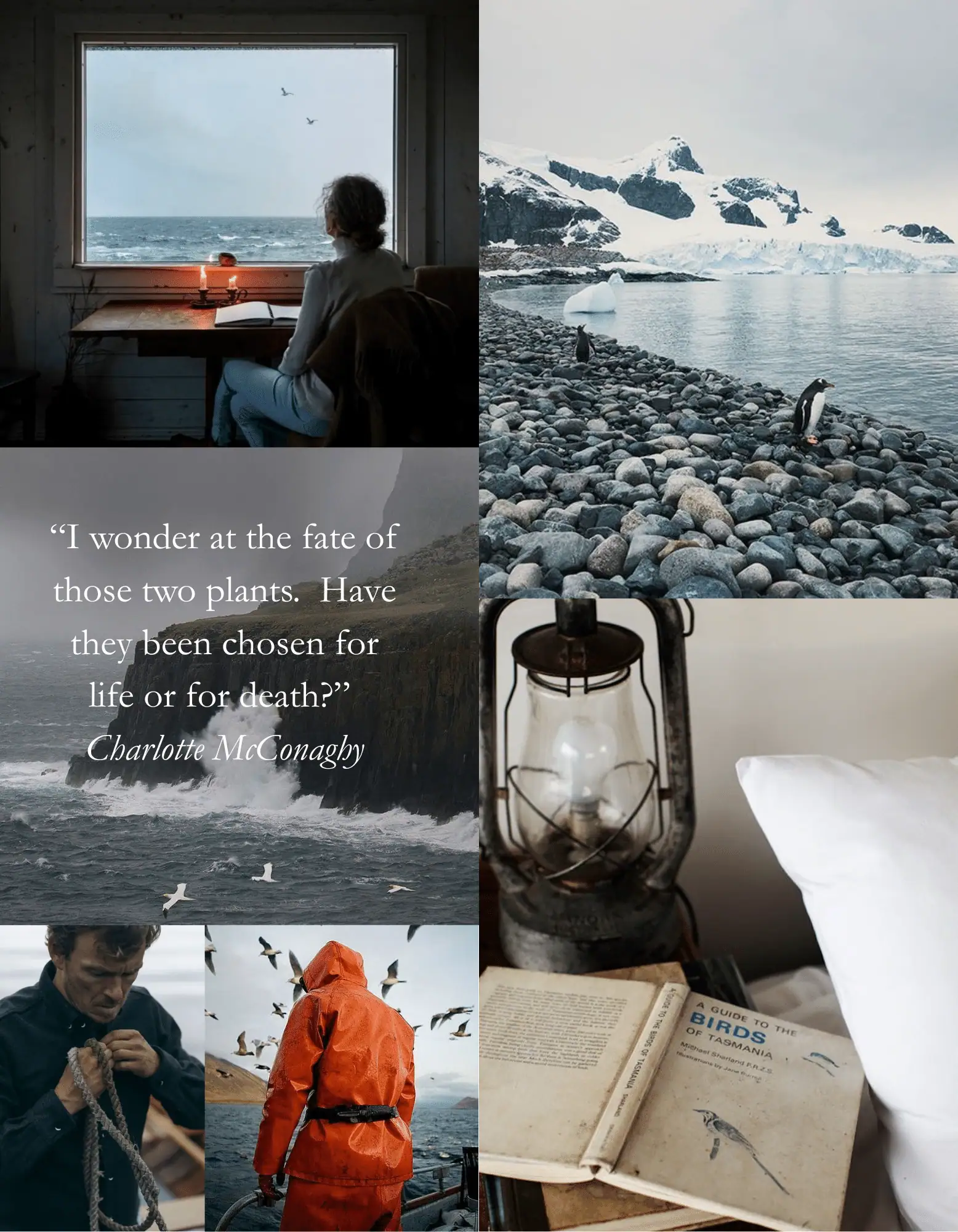
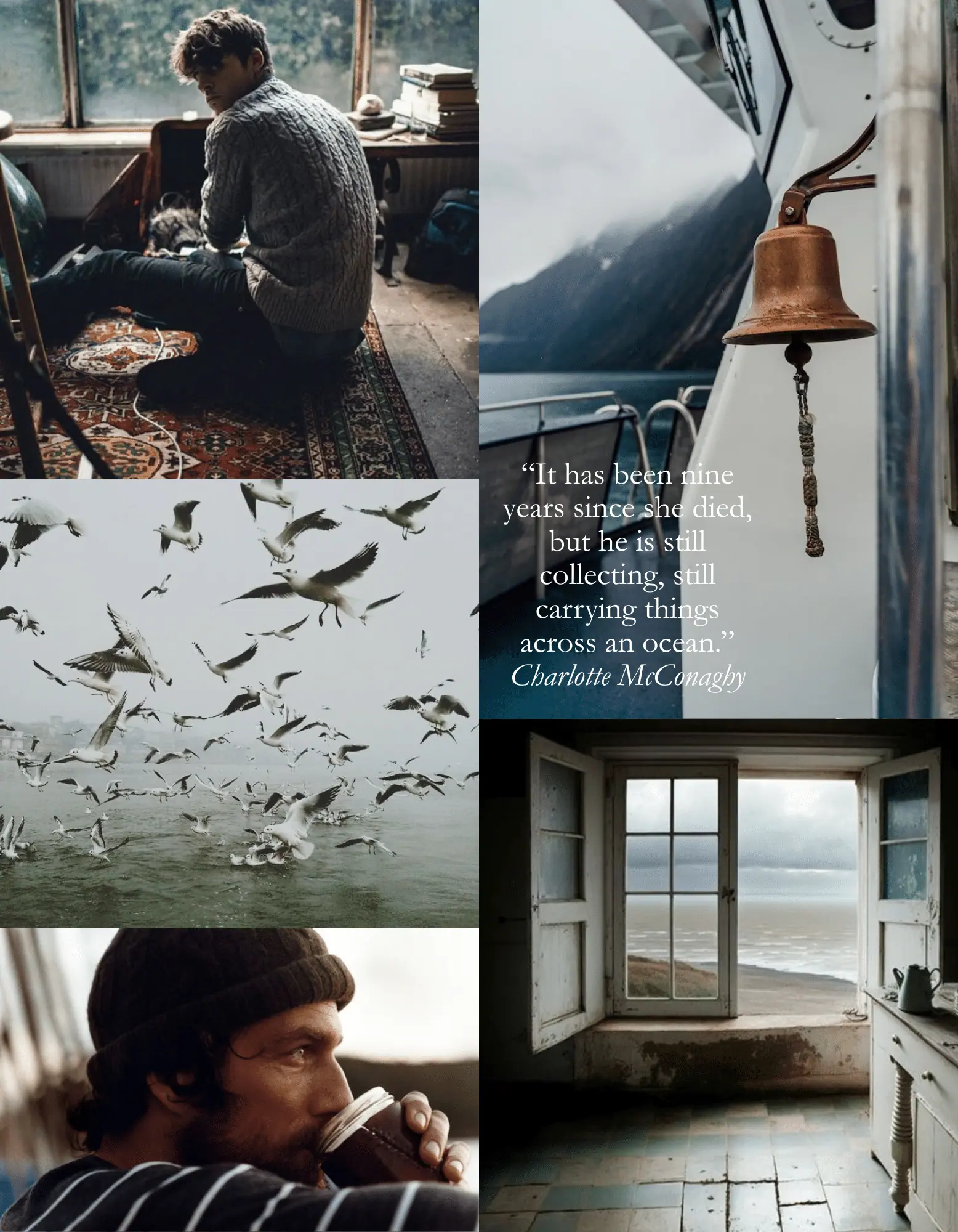
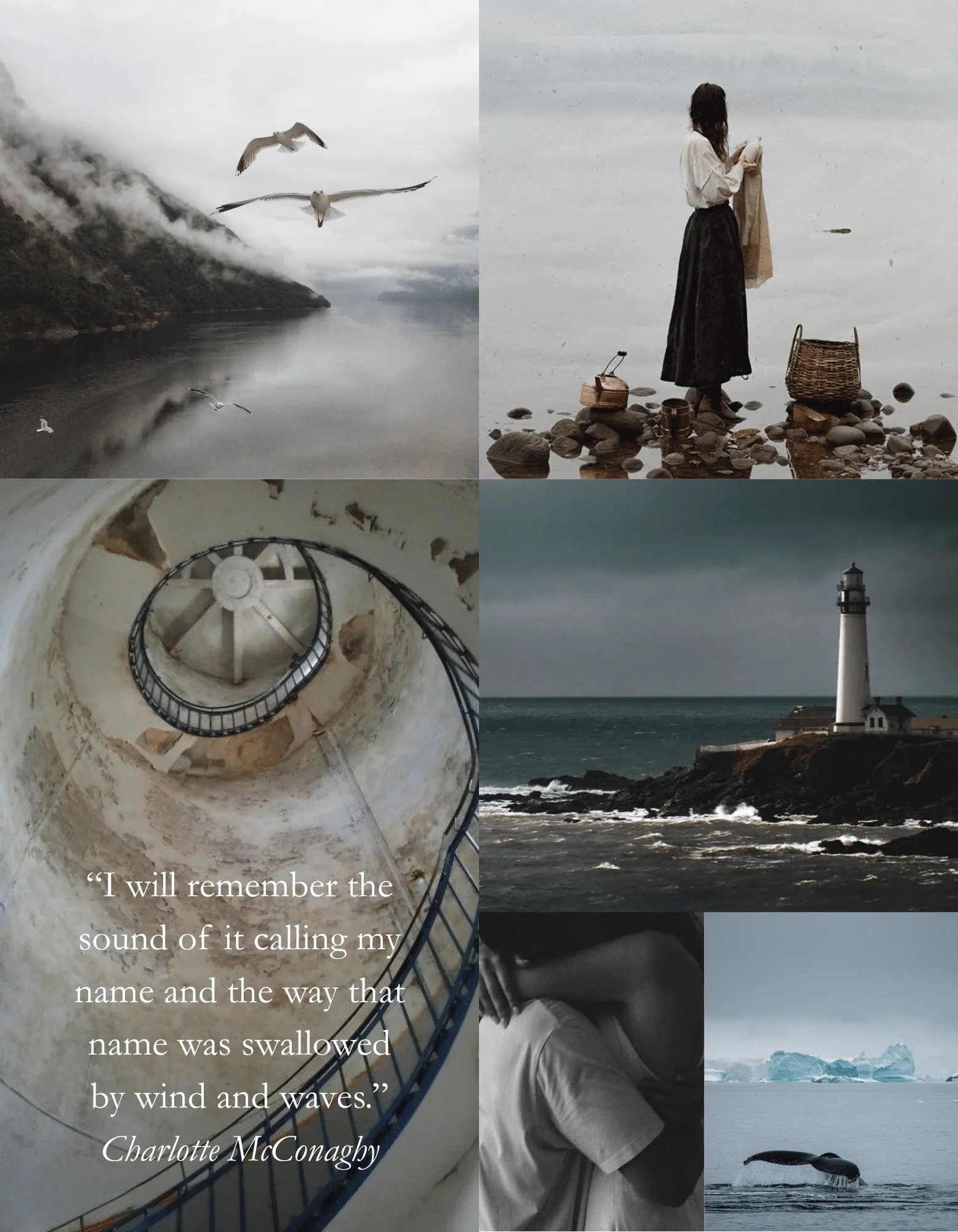
Wild Dark Shore Book Club Questions.
In case you are hosting an in-person club, or want to do some guided reflecting on the work, I put together a couple of questions below. Feel free to jump into some or any of these in the comments, too!
01. Why do you think WDS alternated between narrators? What effect did this have on the plot?
02. Did you read the word “shore” (from the title) as I did, as an avatar for the overarching feeling of the book? What do you think is “The Wild Dark Shore”? Why would McConaghy anchor us in that language, or that image?
03. What did you make of the voices of the wind, and the dead, in this book? They are accepted without narrative friction; Dom hears his wife, and it is represented as actual conversation.
04. The island is both dangerous to and beloved by the Salt family — especially Fen and Dom. What did you make of their connection to the island? How is Shearwater treated in the novel — as a setting, as a plot catalyst, as…? (What else is it?)
05. Let’s talk about Raff and his music — violin and whale song. How does this shape or reflect the text? (At one point, Raff “trades” his punching bag for his musical instruments. Are they substitutes for one another in some way? Why or why not?)
06. So many of the characters are complex and empathetic, but Hank is portrayed as greedy and self-preserving, with limited positive attributes. What did you make of his character?
07. We witness several climate catastrophes in the novel: fire, flood, storm, thaw. What portrait does McConaghy paint of nature, and its future?
08. How would categorize Wild Dark Shore in terms of genre?
Book Club Fare for Wild Dark Shore.
Are you hosting an in-person gathering for this book? This was always one of my favorite parts of my in-person book club in Chicago: designing a themed menu. I like the idea of putting out a spread of tinned fishes with crackers and hard cheese. My cousin-in-law takes people on expeditions to Antartica (!!! — her business is called Quixote Expeditions if you’re interested; tell her I sent ya!) and this is the kind of snack they might offer, as items are shelf stable for some time. If you want something more robust, this is the perfect occasion for a seafood plateau — oysters, shrimp, clams. If you’re feeling super splurgey, crab claws or lobster! And of course all the accoutrements: mignonette, cocktail sauce, lemon wedges, maybe a mustard sauce for the crab claws, or drawn butter.
On the beverage front, I asked myself: “what cocktail brings to mind the maritime — the cold, the salty, the oceanic?” If you’re an advanced cocktailer, you might try Punchdrink’s Sailor’s Paradise, which involves pickled melon brine (!) and suggests an oyster for garnish.
If you’re after something lower-key (I love a built cocktail for parties), let me suggest a perfect Gin and Tonic, and we’ll call it “The Shearwater G&T.” It’s crisp, it’s brisk, the tonic is medicinal–and gin always reminds me of the navy.
The Shearwater G&T.
2 oz Monkey 47 Gin
2 oz fever tree tonic
For garnish: Lime wedge, juniper berry
Fill a collins glass with ice. Add gin, then tonic. Squeeze a lime wedge into glass and add the wedge to the glass, too. Crush juniper berries using a mortar and pestle and add to gin glass.
A Wild Dark Shore Moody Playlist.
This text is so rich, the setting so atmospheric: the novel gave me instant ideas about a playlist to match. This may not be ideal for an actual book club — a little too slow/heavy for a social event? For that occasion, I’d recommend my dinner party playlist. But if you want to be in all of your feelings while reading and crying to this book, you might give this one a listen. (On Apple here, on Spotify here.) This is a moody mix of sea songs, ballads about endings, and voices that strum the heart. “Slow Dancing in a Burning Room” felt just right for Rowan and her grief over the fire.
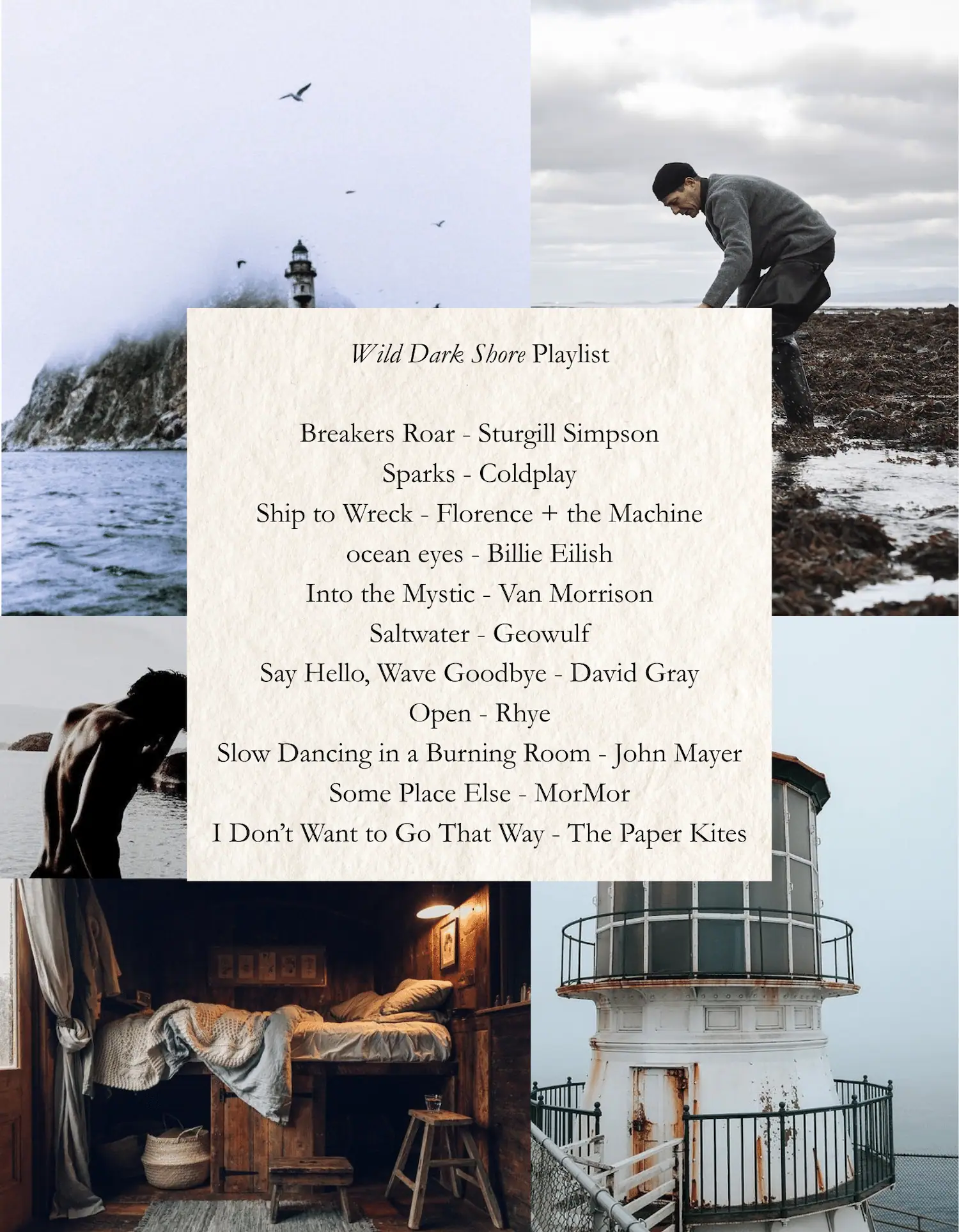
WDS Dream Casting.
I hope this book is adapted to screen — the plot is wild and thrilling, and the setting visually evocative. I know Dom is probably fair-haired like his children, but I imagined a dark and swarthy hero — someone with the quiet strength of Tom Hardy but maybe more wiriness and communicability? I don’t know, but he looks in my mind’s eye like a blend of these random handsome fishermen I found on Pinterest:
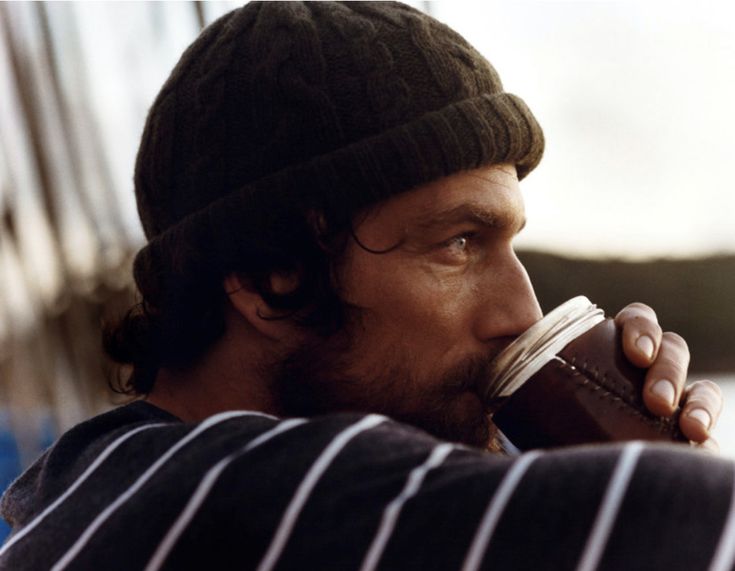
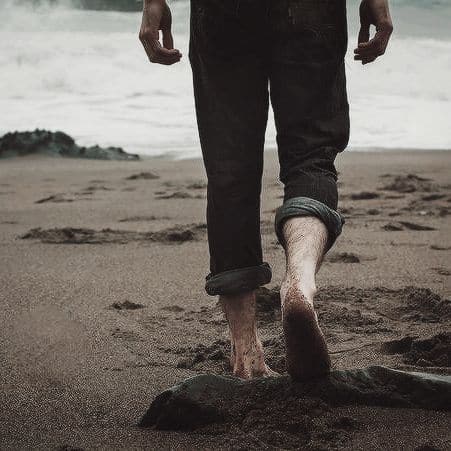
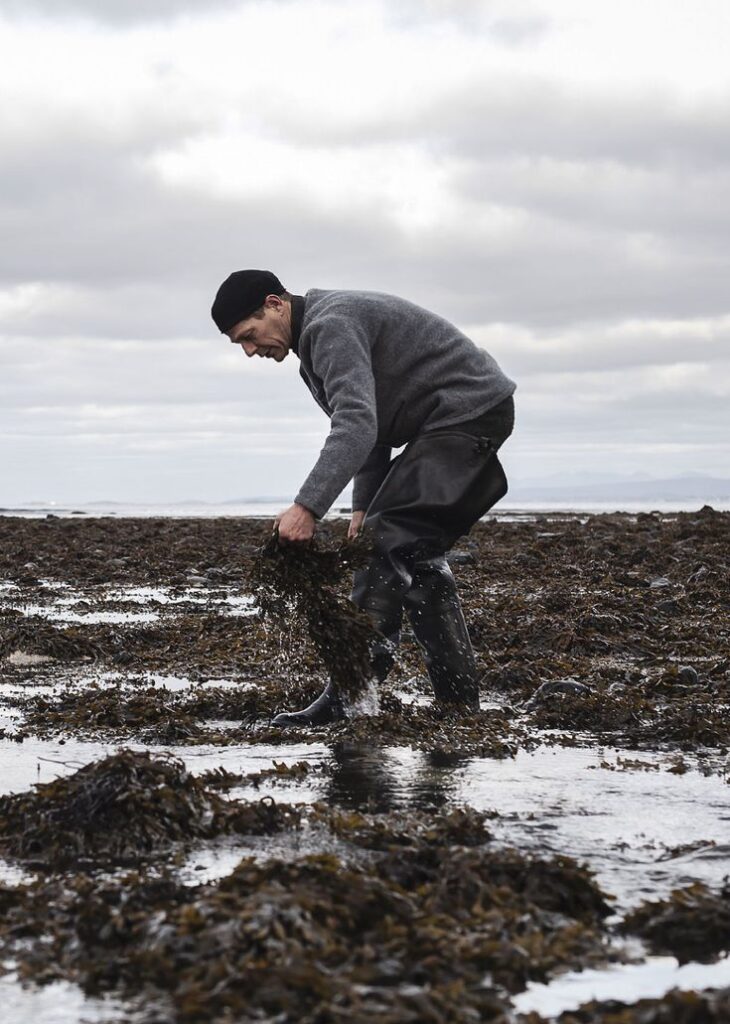
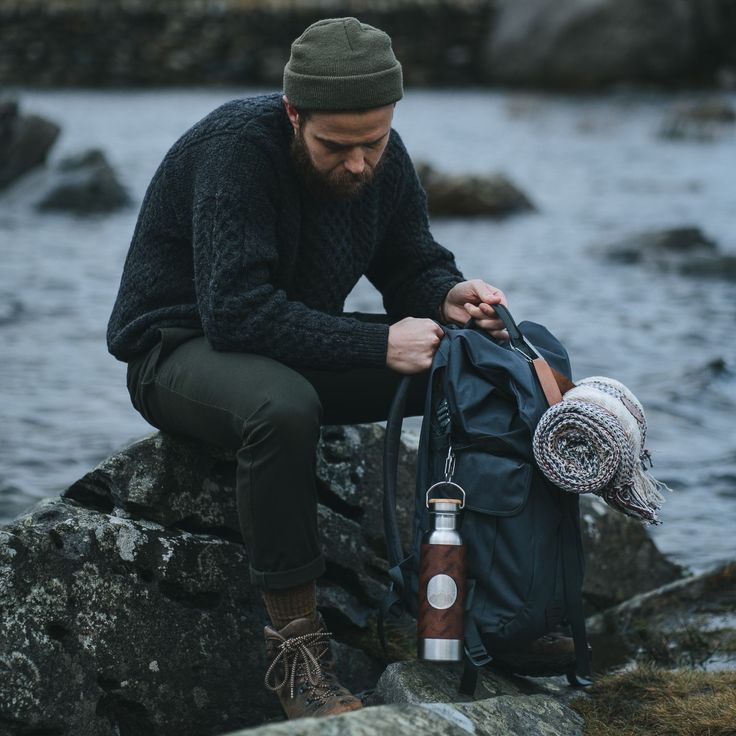
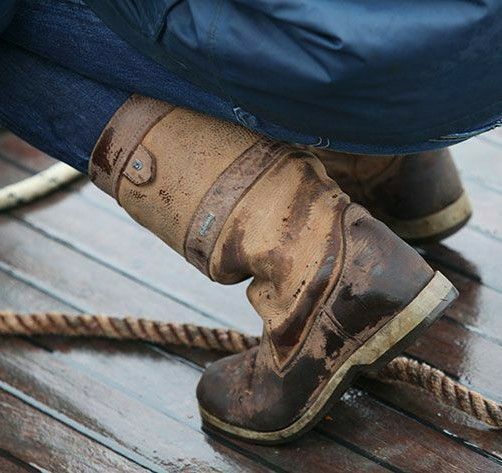
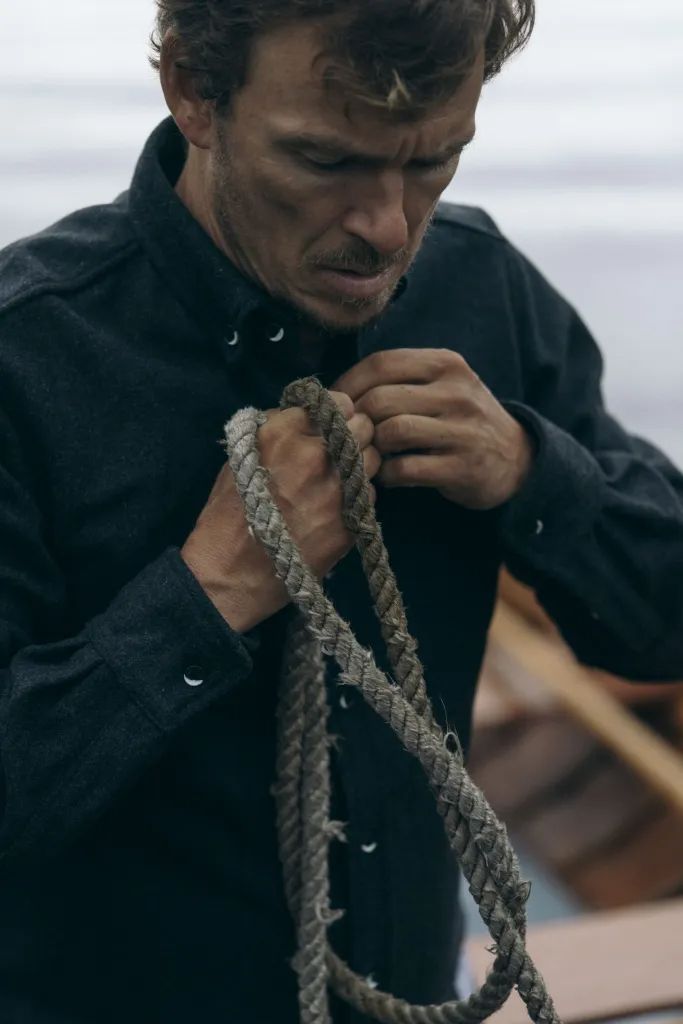
For Rowan: Daisy Edgar Jones! I couldn’t get her out of my head for this character. Or maybe someone like Riley Keough?
Who else do you think might be a good cast for a film adaptation?
Next Month’s Magpie Book Club Pick: Orbital by Samantha Harvey.
Next month’s book club pick is Orbital by Samantha Harvey, a Booker Prize winner. Description: “A slender novel of epic power and the winner of the Booker Prize 2024, Orbital deftly snapshots one day in the lives of six women and men traveling through space…Their experiences of sixteen sunrises and sunsets and the bright, blinking constellations of the galaxy are at once breathtakingly awesome and surprisingly intimate.” A completely different look at planet earth than the one offered by McConaghy, but seeming to pluck on similar strings–I thought this would be interesting to read in conversation with Wild Dark Shore, and I’m also interested in the prominence of space books right now — Taylor Jenkins Reid’s latest, Atmosphere, is also focused on astronauts.
Beyond that, a Magpie reader compelling described Orbital as her top book of 2024, adding “I never would have thought I’d like a book about astronauts in a space station orbiting the earth but boy does it capture the bigness and smallness of living. The prose is so good, meditative, subtle and the imagery vividly transports you to the foreign world of an orbiting space station. I found just the premise of being able to imagine myself falling through space had a profound effect on the experience of reading the book.” Ad lunam!
Sign Up for Magpie Book Club Emails.
This morning, I sent a special edition newsletter to book club email subscribers; you can sign up here! (If you already subscribe to my newsletter, you received this as well!) I will be sending out a once or twice a month newsletter to the book club list!
P.S. More recent book reviews here and here.
P.P.S. No one is paying as much attention to your life as you are, so you might as well…!
P.P.P.S. The plum you’ll eat next summer is waiting for you.
+My book, Small Wonders, is now available for pre-order! This is a collection of essays, musings, and list poetry on the art of paying attention, noticing love in its smallest denominations, and finding the miraculous in the mundane. It is an extension of the writing here on the blog, and is organized around the themes we often discuss here: the dance of motherhood, inheritances and intimacies, the natural world, and the wide world of language. I am so proud of it and hope you will find it a worthy companion for your legato-style mornings.
This post may contain affiliate links. If you make a purchase through the links above, I may receive compensation.


I also loved the book and thought the plot and multiple narratives were masterfully handled. There were many meaningful themes here, and it was beautifully written. When Rowan died – I nearly cried, which I’ve only done once when reading a book. Years ago I cried – sobbed – when I got to the end of Les Miserables. I felt your review was spot on, Jen. Very thorough. I also enjoyed your photos and book club suggestions. I picked this book for our book club, so I’ll be hosting in-person and having the annual dinner for the club. I will be using some of your suggestions, so thanks for that! Very happy I found your site and will be signing up for your emails! Happy reading!
I’m so glad my thoughts resonated! Thanks so much for sharing — I’m pinching myself that you’ll be using some of my suggestions for your book club!! So fabulous!! Let me know how it goes. What are you reading next?!
xx
I’m not sure what our next book will be; the next host will announce it at my book club hosting. However, I do know she is a Frederik Bachman fan, so I’m thinking it might be ‘My Friends…’ We’ll see. I have enjoyed some of his books, but not all. I feel some of his narratives go down a rabbit hole and don’t move the story forward. I will be reading Orbital for the Magie Book Club. Looking forward to it!
Yay!! Keep me posted on what you think!!
I am late to this discussion but ran right to your review after finishing this extraordinary book. I loved reading your thoughts and everyone’s comments. One of my favorite moments that wasn’t mentioned was the passage when Rowan dies, when she says her body will become the salt of the water. I read this as symbolic. She didn’t actually become salt as her body was taken from the island, but instead she became A Salt; a member of their family who could no longer be separated from them. As much as I hated her loss, it fit so well within the themes of the book and I thought it was a beautiful ending to a beautiful story.
Wow – I love this read! Thanks for sharing. I also reacted strongly to the idea of the family coming together, falling apart, coming back together, losing members, gaining others. It gave me a sense of hope honestly!
xx
I’m late to the discussion because I just finished the book last night. I couldn’t get over Dom. How much he loved the kids but didn’t know how to reach them. His relationship with each of them broke my heart, how helpless he felt against Raff’s anger and Fen’s shame, how deeply he didn’t want to break Orly. I desperately wanted him to reach out and hug them, really hug them. I was surprised how much I noticed a lack of physical touch in the story – my experience of parenthood so far has been so physical. I thought Dom’s relationship with Orly seemed most comfortable because they touched – he put him on his shoulders, carried him at times. I couldn’t help but wonder what I would do – for Dom, if everything felt like it would fall away, fall apart, was he trying not to reach out to hold tighter to what he had, but perhaps keep his hands to himself, trying not to make it worse? Rowan seemed to open his need for physical affection again, and I felt such deep satisfaction in the scene on the beach where Dom’s arms were around all three of his children. This was such a moving read and in many ways I’m sad that it’s over.
I relate to this reading so much — I agree that Dom’s relationship with his children felt so tender, so bruise-like to read about. I was especially emotional about the misfirings and miscommunications (or lack of communications) with Fen — you could see he felt differently on the inside in the chapters he narrated but he often couldn’t find the words! Very moving.
xx
What a book! McConaghy did an excellent job with the plot, the language, and the themes she used throughout. I was most drawn to the realization Rowan has about her prior thoughts on love, “I also think of how my husband taught me something else, something so wrong I am stunned that I ever believed it: that in the face of the world’s end love should shrink.”
It’s natural these days to want to pull back or give less when faced with the possibility of loss. But with all the painful things happening today, to let love diminish would be the biggest loss. Thank you for selecting WDS as the book club choice. It was a wonderful read.
I was so moved by that line and ethos, too. It ended up — despite the subject matter — being an uplifting and optimistic read I felt!
xx
I definitely need to read this! I did read Orbital. Can’t wait to see what you think of it!
Can’t wait to compare notes!! xx
If you haven’t read Theo of Golden, I think you will enjoy it. One of my favorite books, definitely a feel good story!
I too loved WDS!! So engrossing and wanting to learn more of each character. My takeaway resonates too with the Amy on motherhood and what that encompasses. So sad to have read that Rowan died but had the opportunity to have a taste of to learn and feel what love is like as mother . Also the way the author explores each of the children and Dom in dealing with Claire being absent in their lives.. Definitely a lot to contemplate of love, life and sacrifices. Surely a hangover for me….
Yes – so true. And the way Claire dies, too, bringing her child into the world — profound, and so deeply sad and also beautiful. I am still in the thrall of this book!
xx
I loved WDS. I found it compelling, evocative, and times, a little intrusive even. I loved that it was cli-fi in the dressings of a thriller (but really, is there any other way to do cli-fi?), the writing was somehow both lush and sparse, and I truly felt the wind and cold battering me as I read it. (Probably helped by the fact that I read over a very cold winter’s weekend, bare trees visible from my spot on the couch and wind and rain lashing the windows!) I did not see the ending coming at all and was devastated when I realised Rowan had died to save Orly, but what a meditation that is on the different ways to love and care for someone.
On reflection, motherhood is not just a theme in this novel, but a question searching for an answer – whether and why to become a mother, what it means to be a good mother, the impressions mothers can leave behind – explored on so many different levels: through the long shadows cast by Claire’s life and passing, Rowan’s relationship with Dom’s children, her relationship with her own mother, the discussions around having children with her husband, even the seals and the whales and their offspring.
I also liked the containment the desolate, frigid island setting provided, and thought McConaghy made good use that. Even in the brief moments we were taken off the island and onto Row’s patch of land, Shearwater never seemed very far away. The need to save the seed bank ended up strong a plot device in my mind, a way to move the true story along and give rise to plant-based allegories. Clever, clever, clever!
Absolutely love your notes on how the book examines motherhood, “as a question searching for an answer.” I kept thinking of how the author has two very young children and how motherhood is really all-encompassing when you have children under two — and I felt strangely perhaps lucky / glad / impressed / awestruck that she had the wherewithal to write while her kids are so young because she is in such a tender headspace at the very start of it all, possibly having recently asked herself “do I want to be a mother?” Such an interesting look at the subject!
xx
I really loved the book and found it compelling and beautiful. I loved all of the main characters. My only frustration was when it was clear that Rowan had gained the trust of the family (and vice versa), yet they still couldn’t openly talk about things that needed to be said. There were many times where I thought, “Just go *ask* him.” I can only conclude it was a plot device.
Good point – I was frustrated by that, too. But I think in a way a lot of the characters are trapped/isolated/unable to self-express, too — I think we’re meant to see them this way. I felt this particularly with the kids, who were absorbing a lot of grief (their own and their father’s) and didn’t know how to communicate around that — especially with the son’s music and boxing; both felt like “safer” ways to express themselves.
xx
I went into the book with no advance knowledge of it, I had only seen the rave reviews and mentions on the web. So I didn’t really know what I was in for. Overall, I thought the prose was lovely to read and the way the plot was crafted was masterful storytelling. I also enjoyed the multi POV of the characters. The visual storytelling was treat, too- I felt like I could SEE the island and Rowan’s land before the wildfires. BUT not knowing what to expect left me unprepared for the grief of Rowan’s death. I get it, I do. But I thought for sure she would be “saved” at the end, and when she wasn’t….UGH.
On another note, I live in a 99 year old bungalow. The deterioration of everything on the island definitely played with my head a bit, and had me looking around to make sure my house remained standing and intact, lol.
This one left me with a massive book hangover.
I was also unprepared for Rowan’s death! But I think it made me respect McConaghy more — I’m sure that was a tough ending to write, but it really melded well with the book’s motifs around self-sacrifice for the future, the provisional ways we connect with one another while earthside, and the porousness between life and death. But oyy it really caught me off guard.
I can’t imagine how the book would play tricks on you in a 99 year old bungalow!! Wow!! I was also wondering how people who live on the water — especially in colder climates — felt reading this.
xx
For those looking for an experiential game to capture some of the wonder and danger of the Sea, I recommend The Sailor’s Dream, an iPad game that is also a concept album. It doesn’t have straightforward conclusions or really any way to win, but it’s beautiful and often meditative. I always imagined the individual game from Ender’s Game was something like it.
So cool – thanks for sharing! xx